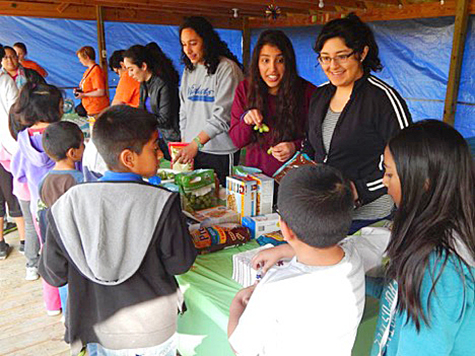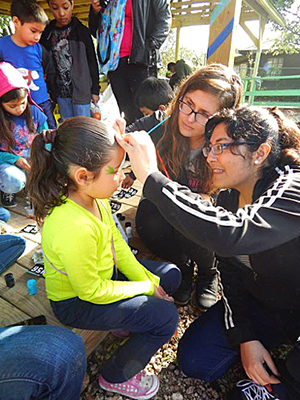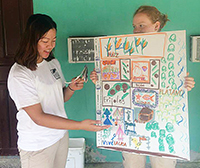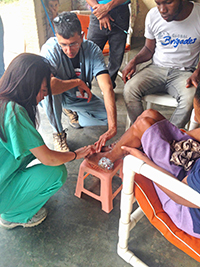
in San Juan, Texas. (Credit: Provided by Itzel Lopez)
Gloria recently returned from San Juan, Texas, near the U.S.-Mexico border, where she and other students volunteered for Proyecto Azteca, a housing program that serves farm workers and other low-income families. She said the experience has strengthened her desire to serve Latino immigrant communities.
“This short period of time was not nearly enough to enact social change, but this experience will stay with me,” said Gloria, who is studying anthropology in Arts & Sciences. “Our trip was an important reminder not only of the challenges that our fellow brothers and sisters on this Earth can face due to structural inequalities, but also the power of service, friendship and community.”

The WashU students helped residents waterproof roofs and nail siding. They also folded clothes at a refugee center and played with youngsters at a community program.
Founded in 1991, Proyecto Azteca was created to address Third World living conditions in the region’s “colonias,” isolated pockets of oppressive poverty.
Today, the program builds 50 homes a year for low-income families. In return, the families provide 550 hours of sweat equity.
“We did whatever they needed and wanted from us,” said Itzel Lopez, a sophomore in Arts & Sciences. “But I felt like I was the one to be given a gift. I saw a young girl who had been stuck in a prison cell for four days while suffering from asthma run toward her dad when she got a previously owned raincoat.
“There were so many emotions felt on any given day, but gratitude and hope were the brightest.”
Lopez said she learned three lessons during the trip:
“The significance of being present; the gift of gratitude and hope; and the blessing of acknowledgement.”

She said she learned there were more similarities than differences in the people she encountered. “I saw people like me, with their own struggles, stories and emotions,” Lopez said. “But overall, they needed to be seen, they needed to be acknowledged. These humans are more than statistics, and they are more than a wall to divide two countries established by imaginary lines.
“They are like me, with stories to be told if only we ask,” she said.
Building bridges:
WashU students at work
Washington University students also traveled to other locations in the United States and Central America during spring break.
Habitat for Humanity volunteers built homes in the Cherokee community of Tahlequah, Okla., while Danforth Scholars built homes in New Orleans. The Community Service Office sponsored a trip to Memphis, where students assisted in a number of civil rights and education initiatives.

International nonprofit Global Brigades organized three trips – one to Panama, where students constructed a sustainable tilapia pond for the indigenous community of Ipeti Embera, and two to Honduras, where students worked to provide clean water and home medical care.
That’s where Cynthia Zhang, a freshman in Arts & Sciences, observed a team of American and Honduran doctors treat 800 patients in three days. “I developed an immense appreciation for what they do,” Zhang said.
“The health professionals simply worked with what they had and made the best of their resources and environment so that they could serve their most underprivileged countrymen and women.
“As a pre-medicine student, this experience has helped evolve my idea of the doctor I want to become,” Zhang said.